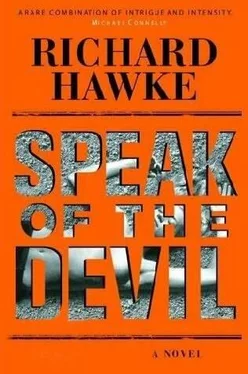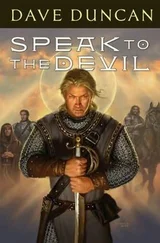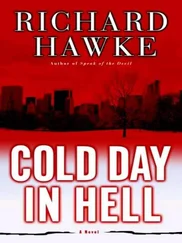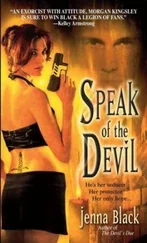I heard movement from the living room, and I stepped over to the door and pulled it closed. Margo sat up higher on the pillows.
“Daddy always says to doubt.”
“I know he does. And it drives your mother crazy.”
“If this were that tall policeman. The black one?”
“Patrick Noon.”
“If this was him, I’d let the scales tip toward believing him. But this guy?” She raised both hands, palms flat, then let one rise higher while the other dropped all the way to the bed. She lowered her voice. “That’s a murderer in there, Fritz. That’s all I’m saying. Heepy-creepy.”
I looked at the three items I was holding. Margo was right, of course. My line of business is about doubt, not about trust. I’ve had more than a few meaty discussions with super-shrink Phyllis Scott on that topic in my day. I ran back Cox’s story in my head. Simple. Clean. Believable. Still, Margo was right. From someone like Patrick Noon, it would be easy to believe. But with Leonard Cox?
I handed one of the items to Margo. “Put this away, will you?” Then I leaned forward and gave her a peck on the top of the head.
“Down here, stupid,” she said, and I gave her a peck on the lips. “That’s better.”
I indicated her book. “Find us a sexy poem. I’ll go ditch the cop and be right back.”
I returned to the living room. Cox was standing in front of the bookcases. His water glass was on the coffee table. I noticed he hadn’t touched it. He turned sharply as I came into the room.
“Everything okay?”
“Fine,” I said. He didn’t look convinced. “Just wiping up a domestic puddle.” I handed him Donna Bia’s lipstick and her vial of powder.
“That’s it?”
“That’s all I found.”
“Those two things?”
“Right.”
“Well… okay.” He sounded doubtful. He pocketed the two items. At the door, he started to say something, then changed his mind and left without a further word.
Margo had the sexy poem all ready when I returned to the bedroom. It wasn’t from the book she was reading. She made it up herself.
“You’re a talented chick, aren’t you?” I said, turning off the light.
A warm foot touched my knee. “So I’m told.”
I SHOWERED AT MARGO’S IN THE MORNING-EARLY, BEFORE SHE’D gotten up-but had nothing clean to put on, so I took the subway downtown and worked my way into fresh skins at my place. I brewed up some coffee. I would’ve as soon flipped open my skull and poured it directly onto my brain, but the hinges were too rusty.
There were two messages on my machine, both from Captain John Kersauson of the Ninety-fifth Precinct. Apparently I hadn’t given him my card, which has my cell phone number, so he’d found me in the book. He said he had called my office number as well. The first message was a request that I come into the station at my earliest convenience to give a statement to the detective in charge of the Donna Bia murder concerning my activities the night before from the time I left the police station, specifically those activities concerning the deceased. The second message had come forty minutes later and told me to skip it “for now.” He went on, “I spoke with the commissioner. He says you’re busy. Must be nice having a fairy godfather like that.”
I had already determined that my first stop of the morning would be to see the fairy godfather himself. I recalled last night’s encounter with the brooding thundercloud that was Tommy Carroll. No one would ever accuse him of being a happy man; that was never the cut of his suit. But I knew he was a proud man, hardworking and accomplished well beyond the crowd he’d grown up with. Unlike Martin Leavitt, whose aspirations-I believed Carroll was right on this-were aimed for even bigger and glossier brass rings than what he had already achieved, Tommy Carroll’s boyhood dreams had been realized when he became police commissioner for the city of New York. Carroll had reached his Everest. When my father had gotten his nod to head the NYC Police Department, Captain Tommy Carroll had cornered me at one of the congratulatory bashes thrown for the old man and told me that my father was now the most important man in New York City. “Day to day?” he had said. “On the streets? It’s all about the cops. They grease the wheels in this city. All the other crap that’s New York, it doesn’t happen unless you’ve got the cops. It’s your father now who’s going to make this city run. No one else. The man in that office? He’s the king.”
After my father’s disappearance-once it became clear that the disappearance was, in all likelihood, permanent-and after the two subsequent police commissioners had shown the chinks in their armor, Tommy Carroll ascended to the throne and proved himself completely up to the task. I suppose you could say he was a happy man at that point. Or maybe “satisfied” would be the better word. King Tommy. The most important man in New York City, at least by his own calculus.
But now there was disease-rot-that couldn’t care less how important he was. As far as cancer is concerned, we’re wood and it’s termites. Cancer doesn’t give a damn. It’s equal-opportunity, it’ll hollow out anyone and everyone if given half the chance. I thought of Tommy Carroll standing at his desk the night before, raging impotently. He was an idiot, of course. As long as I’d known him, he’d been a heavy smoker. So this particular time bomb was of his own making. It was the consequence of his own choice. I suppose that’s partly why his feelings about the mayor were so venomous. Leavitt was outside of Carroll’s control. If Martin Leavitt concluded that he needed to knock his police commissioner off the top of Everest in order to keep his own ass clean, that was what he’d do. Carroll had no control over the matter. No wonder he was furious. He was being destroyed from the inside and the outside and there wasn’t a whole hell of a lot he could do about it.
My cell phone went off as I was coming out of my building. That was when I remembered that I’d left Donna Bia’s phone back at Margo’s. It was garbage day, and the green monster was at the curb, roaring as its uniformed handlers tossed black bags of gruel into its maw.
“Hold on!” I yelled into the phone. “I can’t hear you!” I stepped quickly to the corner, where I took the call in front of Rossetti’s bakery.
The caller was Sister Mary Ryan.
“I’m sorry to call you so early, but I have something here I think you should see,” she said.
“What is it?”
“I don’t know. I mean, I don’t know exactly what it means.”
“Does it have to do with Angel Ramos? Did one of the sisters recognize his picture?”
“Not exactly that. But I think it’s important. No, it is important.”
The garbage truck was lumbering my way, black smoke belching from its vertical exhausts, the tin lid flapping. The roar grew.
“I’ll be there as soon as I can!” I yelled into the phone, probably louder than I needed to. But then, my heart seemed to be running faster than necessary, too. I flipped the phone closed as the truck shuddered to a halt.
IT WAS SISTER MARGARET’S SUICIDE NOTE.
God should not test His weakest lambs. I am in too much pain. I’m sorry. I am not purity. I’m filth. I’m dirt. I can’t endanger my sisters any longer. I won’t endanger them. If God won’t slaughter this filthy lamb for the sake of purity then this will be my final gift. Maybe there can be some speck of grace from this. I’ve failed. I hurt. God will spit on me for this. He will shed no tears. I lost Happiness and I’ll never know Her. Who is She? She must hate me as much as I do. I forgive everyone who has hurt me and I ask forgiveness from everyone I hurt. I hurt so much. I have failed. I am so so so sick. Oh Lord, what a useless filthy waste. Forgive me.
Читать дальше












